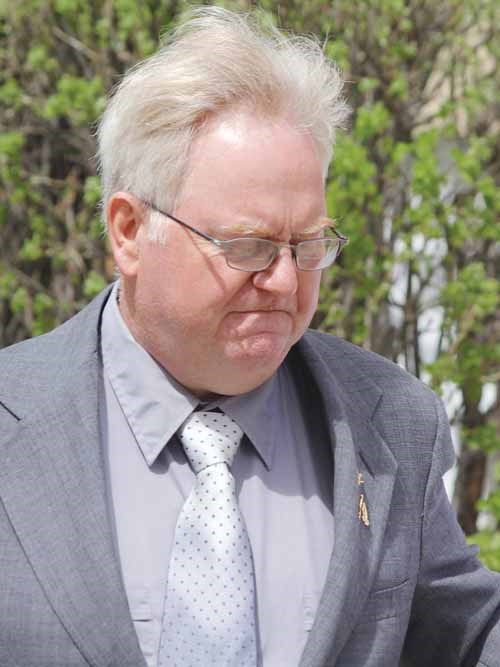Kim Walker himself was the first witness called by the defense in his second-degree murder trial on Tuesday, May 17.
Under examination by defense counsel Balfour Der, Walker recalled his daughter Jadah's dramatic change in behavior in the fall of 2002, starting at approximately the time she become involved with James Hayward. He testified that on Jadah's 16th birthday, Jadah and her mother began an argument that ended in her leaving home and eventually moving in with her boyfriend, James Hayward.
Walker told the jury of his attempts to get help for his daughter through her school counselor, the police, and a Saskatoon rehab facility as he watched her drug use and weight loss spiral out of control. No one he or his wife contacted could help, said Walker.
"I feared for my daughter's life."
At the same time, Walker reported hearing reports from his children and their peers of Hayward's history of violence and steroid use. On the occasions that he met Hayward personally, the 24-year-old was aggressive towards him, Walker claimed.
According to Walker, the situation reached a breaking point when, at the advice of police, he arranged to have Jadah taken to the Yorkton Regional Health Centre's Pine Unit for a 72-hour evaluation under a Mental Health Act warrant. Walker claimed that during the time Jadah was in the hospital, he received threatening phone calls from Hayward.
"I believed he would kill me and my daughter," testified the 54-year-old welder.
Almost immediately after coming home with her parents from the hospital on March 17, 2003, Jadah Walker returned with friends to James Hayward's residence.
Walker was in his basement dressing for work when he heard that Jadah had left, he told the jury. It was the last clear memory he has of the morning.
Walker claimed to have no memory of retrieving or preparing the handgun he later used to shoot James Hayward, and only "flashes" of images from the drive over. Of confronting Hayward at his house on Agricultural Avenue, Walker said he remembers only the enraged Hayward pulling his daughter away then coming towards him with his right fist raised. He denied having any recollection of firing 10 shots at Hayward, but acknowledged that it must have occurred.
Walker said his next clear memory is of sitting in a holding cell after his arrest later that day.
The defense's only other witness was forensic psychiatrist Dr. Robin Menzies. On Wednesday, Menzies testified that he believed Walker's memory loss to be genuine due to a "dissociative state" affecting him on the day of the shooting.
Cross-examination
When it came time for Walker's cross-examination on Tuesday, prosecutor Robin Ritter first asked the defendant to admit that he had, "in front of his daughter," shot "an unarmed man" "in the back" "in his own house." Walker responded that these events "must have" happened, but maintained that he had no memory of them.
Ritter then proceeded to attack dozens of details of Walker's story, including the timeline of Jadah's personality changes. Under Ritter's questioning, Walker admitted that some of Jadah's behavioral problems, including her arrest for cocaine possession at the age of 15, "might have" occurred prior to her involvement with Hayward. Ritter also caused Walker to clarify that Jadah did not immediately move in with Hayward after leaving home, but instead spent some time with friends in a house on Brodie Avenue.
Ritter argued that these facts shed doubt on Walker's portrayal of Hayward as the sole corrupting influence in Jadah's life.
Walker grew increasingly frazzled as Ritter's questioning continued. When after 15 minutes of cross-examination the defendant was unable to recall his daughter's birthday, Ritter asked Walker if he was "feeling well." Walker said that he was not, and Ritter requested an adjournment to allow the defendant a break.
Ritter's questioning was no less aggressive when the trial resumed. The prosecutor grilled Walker on his failure to fully pursue legal options for treating his daughter's addiction. Walker, visibly agitated and uncomfortable on the stand, responded to most questions throughout the cross-examination with answers such as "I don't recall, sir," "I don't understand," or "I don't know."
Walker's interpretation of some of Hayward's statements as death threats against him and his daughter were another point of contention for the prosecutor. Walker admitted that he had never seen or heard of Hayward harming his daughter, and that Jadah had never appeared frightened of him. Ritter suggested that Walker's slaying of Hayward was not a matter of self-defense, but of Walker's fear that he would lose touch with his daughter.
"Would you have done anything to maintain contact with your daughter?" the prosecutor asked.
"I don't know, sir," Walker replied.
Finally, Ritter attempted to cast doubt on Walker's memory lapse, which the prosecutor called "too convenient." Ritter asked how it could be that Walker could remember such details as the look on Hayward's face on the day of the shooting, but not the deafening noise of ten loud shots from the nine-millimeter handgun. Walker offered no new information.
"Were you justified in shooting Mr. Hayward?" Ritter asked at the end of two hours of questioning.
"I don't know, sir," answered Walker.



